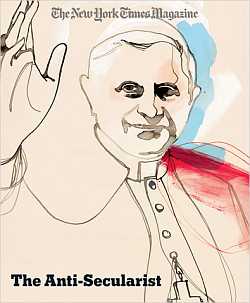Ikke noe overraskende i en slik overskrift, men den er tatt fra overskrifta til en svært lang artikkel i New York Times om pave Benedikt – på forsidebildet blir paven kalt «The Anti-Secularist». I artikkelen leser vi bl.a.:
 Today, as pope Benedict approaches the second anniversary of his papacy (April 19) and his 80th birthday (April 16), it seems clear that Joseph Ratzinger’s lifelong agenda — rooted in Bavarian Catholicism and his experience of Nazism — has been updated, and he is now trying to bring it to bear on the post-9/11 world.
Today, as pope Benedict approaches the second anniversary of his papacy (April 19) and his 80th birthday (April 16), it seems clear that Joseph Ratzinger’s lifelong agenda — rooted in Bavarian Catholicism and his experience of Nazism — has been updated, and he is now trying to bring it to bear on the post-9/11 world.
As it routinely does with journalists, the Vatican declined requests for a papal interview for this article, but Benedict has made his objectives clear in a variety of ways. Compared with his predecessor, who was elected pope at the age of 58, he knows he has a limited time and has been rather direct in advancing his theme.
The poles of his papacy might be seen in the subjects of two books by him just being released in the United States. One is about Jesus. The other is titled “Europe Today and Tomorrow.” Benedict is one of the most intellectual men ever to serve as pope — and surely one of the most intellectual of current world leaders — and he has pinpointed the problem of the age, as well as its solution, at the level of philosophy.
His argument, elaborated in the years leading up to his election and continuing through his daily speeches and pronouncements, reduces to something like this: Secularism may be one of the great developments in history, but the secularism that holds sway in much of the West — that is, in Western Europe — is flawed; it has a bug in its programming. The mistaken conviction that reason and faith are two distinct realms has weakened Europe and has brought it to the verge of catastrophic collapse.
… If you seek a way out of the vast post-9/11 quagmire (Baghdad bomb blasts, Iranian nukes, Danish cartoons, ever-more-bizarre airport security measures and the looming mayhem they are meant to stop), and for that matter if you believe in Europe and “the West” (the ceiling of the Sistine Chapel, a bottle of Chateau Lafite Rothschild, the whole heritage of 2,500 years of history), then now, Benedict in effect argues, the Catholic Church must be heeded. Because its tradition was filtered through the Enlightenment, the thinking goes, the church can provide a bridge between godless rationality and religious fundamentalism.
